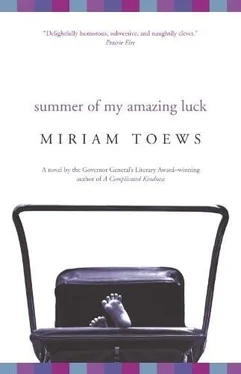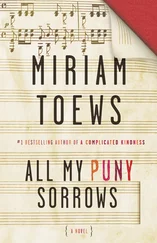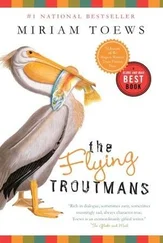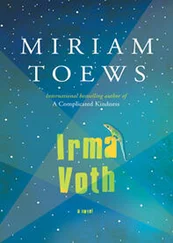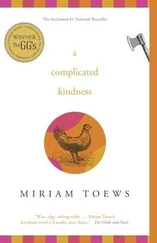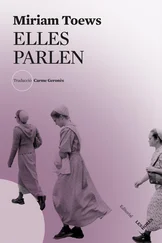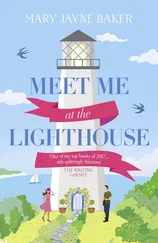I asked Lish if Angela could blackmail him and get more money out of him, maybe take a cruise with the kids, and Lish replied that writers don’t have any money but do have lots of imagination to dream up excuses and lies about their lives and that a blackmail job didn’t stand a snowball’s chance in hell. When Robert De Niro or Mick Jagger are dumped with paternity suits by desperate women, does anybody care? Nope, Angela would have to take her knocks like the rest of us and write her own stories about unhappy love.
Like I said, with Angela’s arrival in early June came the rain. The clouds broke like a million amniotic sacs and didn’t stop dumping rain on us until one month later.
Lish and Angela got along quite well. They’d sit around and talk while their girls played together. Angela taught Lish how to bake bread. Neither one of them faked a big interest in the other’s kids, and if they wanted to yell from time to time, they did. I wasn’t crazy about Angela and in a way I was jealous of the attention Lish gave to her. I told myself it was because they both had daughters of the same age. Anyway, Angela and I were the newcomers and Lish, as de facto mother hen of the block, had decided to take us both under her wing.
Once on a Friday evening when all the fathers lined up their cars and half-tons outside the block, Deadbeat Dad’s Row we called it, Lish thought she had seen the dark head of the fire-eater in one of the cars. She said to me, “Watch my kids,” and took off out the door of her apartment like her hair was on fire. I had never seen Lish move that fast. Her long black hair shot out behind her and her bracelets jangled as she sprinted. A few minutes later she came back and looked at us all as if we were vaguely familiar and sat down at her kitchen table. She played with her hair for a few seconds and then burst our laughing. We all laughed then, relieved.
That evening I bathed Dill in the big tub for the first time and wondered if I had ruined his life by not knowing who his father was. And is, I guess. Somewhere out there in the suburbs, probably, some guy is living with his parents, fixing his car, studying for exams, drinking at socials with guys, trying to pick up girls, Dill’s father. Doesn’t even know it. He’ll probably marry someone pretty and competent and have a family and be proud of them, put up pictures in his office and tumble around with them before bed, never knowing that on the other side of town some girl he boinked when he was too pissed to remember is living on the dole and raising his son.
If only Dill’s dad were dead, that would be so much easier. I have imagined the scene in my mind. And I’ve imagined Dill as a seven-year-old or maybe even younger saying, “By the way Mom, who’s my dad?” And what would I say? “Well, Dill, I really don’t know.” Or would I launch into some inane parable to try and derail his thinking? What would other kids say? Hey Dill, I hear your old lady’s a slut. Doesn’t even know who your old man is. This was my thinking late at night. During the day Lish and some of the others and I would laugh at the bleak humour of our situations. We’d roll our eyes at the thought of trying to parent with some fumbling man and pity women who had to. This was another way in which we separated ourselves from the women in Serenity Place who, we told each other, resented being single mothers and would marry the first man who asked them. Lish would say, “If I had a dollar for every time a man asked me to marry him, I’d be a wealthy woman.” And then she’d pause, and say, “But I’ve got four kids already, I can’t handle another one.” We’d usually join in with the last part of that sentence and then snort through our noses with our mouths shut, like we were some kind of a chorus line. But really it was just an act for me. I’d say it, but I’d cross my fingers under the table, or my toes in my shoe — so I wouldn’t jinx my entire life. I always thought I would have a husband. If I had a dollar for every time I imagined who he might be, I’d be a wealthy woman. Well, I’d be able to buy some furniture anyway.
The first week of rain was bearable. The mosquitoes hadn’t arrived and the rain had provided us all at Half-a-Life with a few interesting challenges. None of us had cars or money for cabs. Even the bus was an extravagance. One bus fare can get you a box of Kraft Dinner or a litre of milk. So with kids and babies and strollers and bags of groceries, and tricycles the little ones would start out on and then abandon, wanting instead to be carried, and the rain coming down on top of everything else, we at Half-a-Life were accustomed to getting wet. Not only that, but the road in front of Half-a-Life had sunk and dipped, so crossing it meant wading through one foot of water. Lish had called the city works department about it, but they had said if they started with our road they’d have to fix everyone’s. We didn’t see the problem with this. Anyway, we couldn’t stay in all day. At least I couldn’t. Lish could because her apartment was a real home and being in it so much of the time didn’t make her crazy like it did me. In fact I had known her to spend entire days curled up in her big brown chair. She’d get up to prepare food for the kids or find a lost toy, but that was about it. She wasn’t despondent or anything, just content. People would come and go and she would hold court from her brown chair.
My apartment was kind of empty and white. Or eggshell really. Stuff sat around in boxes. Terrapin said maybe I was depressed and couldn’t motivate myself to unpack. But I was after all only eighteen years old and had never set up a home of my own before. She offered me something called echinacea she had purchased from Vita Health, promising it would pick me up. I told her I didn’t need picking up, I needed a break from Dill to think and organize and maybe go out and pick up some things from the Goodwill. Maybe even from my dad’s house. Her head tilted to one side and moved up and down like a big oil drill and she made herself look empathetic. She could have offered to babysit Dill so I could set up my place properly. But no. Terrapin smiled wanly, tilting her oil drill head, and then hugged me. I was horrified. And then immediately relieved that she hadn’t offered to babysit Dill because the thought of her holding Dill against her scratchy Guatemalan vest and anointing him with god knows what kind of oils and tinctures gave me the creeps.
Anyway, the less stuff I had cluttering up my apartment, the easier it was for Sing Dylan to spray for roaches. Lish would have babysat gladly, but I was nervous about her girls lugging Dill around and maybe dropping him. Besides, when I went out Lish and the twins usually came along. If I didn’t want them to I’d have to sneak out the back door past Sing Dylan’s apartment and traipse across the gravel parking lot. Dill’s umbrella stroller was falling apart as it was and the gravel made it worse. With the puddles and the muck, crossing it was almost impossible. So I usually just went out the front door and took my chances.
Every day it rained. The day I had to go to the welfare office for my regular lecture, it was raining like mad. My appointment was for 2:15. That really didn’t mean a thing because when you got to the office everyone just threw their name and case number into a pail and then sat down for about two or three hours. The names were picked at random as far as I could tell.
The very first time I had been to the dole, I had waited with Dill for about two-and-a-half hours. Right next to the dole headquarters was the Sals. I had jokingly suggested to my worker when I finally got in to see her that there should be some kind of intercom system installed between the dole building and the Sals and that way we could all sit in the Sals drinking coffee and eating cheese nips until we were called in to confess our sins of poverty and joblessness. She looked at me as if I had just told her she had an enormous butt.
Читать дальше
